(完整word版)小学六年级英语一般过去时
- 格式:doc
- 大小:11.89 KB
- 文档页数:2
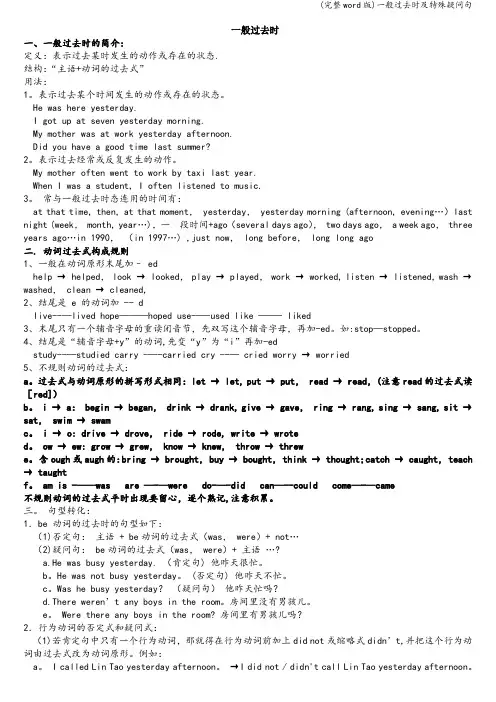
一般过去时一、一般过去时的简介:定义:表示过去某时发生的动作或存在的状态.结构:“主语+动词的过去式”用法:1。
表示过去某个时间发生的动作或存在的状态。
He was here yesterday.I got up at seven yesterday morning.My mother was at work yesterday afternoon.Did you have a good time last summer?2。
表示过去经常或反复发生的动作。
My mother often went to work by taxi last year.When I was a student, I often listened to music.3。
常与一般过去时态连用的时间有:at that time, then, at that moment, yesterday, yesterday morning (afternoon, evening…)last night (week, month, year…),一段时间+ago(several days ago), two days ago, a week ago, three years ago…in 1990,(in 1997…) ,just now, long before, long long ago二. 动词过去式构成规则1、一般在动词原形末尾加– edhelp → helped, look → looked, play → played, work → worked, listen → listened, wash →washed, clean → cleaned,2、结尾是 e 的动词加 -- dlive--—lived hope———hoped use-—-used like ——- liked3、末尾只有一个辅音字母的重读闭音节,先双写这个辅音字母,再加-ed。
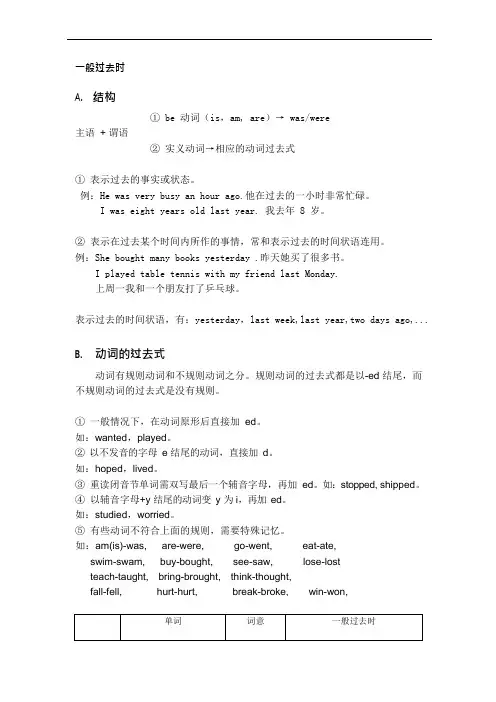
一般过去时A.结构① be 动词(is,am, are)→ was/were主语+ 谓语②实义动词→相应的动词过去式①表示过去的事实或状态。
例:He was very busy an hour ago.他在过去的一小时非常忙碌。
I was eight years old last year. 我去年 8 岁。
②表示在过去某个时间内所作的事情,常和表示过去的时间状语连用。
例:She bought many books yesterday .昨天她买了很多书。
I played table tennis with my friend last Monday.上周一我和一个朋友打了乒乓球。
表示过去的时间状语,有:yesterday,last week,last year,two days ago,...B. 动词的过去式动词有规则动词和不规则动词之分。
规则动词的过去式都是以-ed 结尾,而不规则动词的过去式是没有规则。
①一般情况下,在动词原形后直接加ed。
如:wanted,played。
②以不发音的字母e 结尾的动词,直接加d。
如:hoped,lived。
③重读闭音节单词需双写最后一个辅音字母,再加ed。
如:stopped, shipped。
④以辅音字母+y 结尾的动词变y 为i,再加ed。
如:studied,worried。
⑤有些动词不符合上面的规则,需要特殊记忆。
如:am(is)-was, are-were, go-went, eat-ate,swim-swam, buy-bought, see-saw, lose-lostteach-taught, bring-brought, think-thought,fall-fell, hurt-hurt, break-broke, win-won,直接加edwalk 走climb 爬turn 转弯learn 学习cook dinner 做饭play the piano 弹钢琴visit grandparents 看望(外)祖父母clean the bedroom 打扫卧室wash the clothes 洗衣服answer the phone 接电话listen to music 听音乐clean the room 打扫房间collect insects 收集昆虫jump 跳row 划work 工作show 展示look 看help 帮助relax 放松return 归还pass 传递watch insects 观察昆虫pick up leaves 采摘树叶paint 绘画kick 踢ski 滑雪直接加dlike 像,喜欢live 居住dance 跳舞use a computer 使用计算机love 爱taste 尝close 关上prepare 准备不规则变化eat 吃have 有;吃buy 买take 买;带go 去sing 唱歌teach(taught)教run(ran)跑fight(fought)打架get up 起床swim 游泳fly 飞swing(swung)荡sleep(slept)睡觉sweep(swept) the floor 扫地do 做make the bed 铺床draw(drew) pictures 画画write(wrote) a letter 写信catch(caught)butterflies 捉蝴蝶meet(met) 见面drink(drank)喝tell(told)告诉ride(rode)骑find(found)寻找到drive(drove)驾驶come(came)来become(became)变成feel(felt)感觉到think(thought)思考meet(met)遇见fall(fell)落下leave 离开wake(woke) up 醒来bring 带来is am are see 看到grow 种植grew stand(stood)站立词形不变read books 读书put 放set the table 摆饭桌hit (hit)撞击、打cut 切、割最后一个字母双写再加edstop(stopped)停shop 购物把y 变成i 再加edempty the trash 倒垃圾study 学习C. 过去式的肯定、否定、疑问及简短回答①过去式的肯定、否定、疑问及简短回答的形式可表示如下:肯定句I (He, She, We, You, They) went there by bus.否定句I (He, She, We, You, They) didn't go there by bus.疑问句Did I (he, she, we, you ,they) go the by bus?简短回答Yes, I (He, She, We, You, They) did.No, I (He, She, We, You, They) didn't.动词be 的肯定、否定、疑问及简短回答形式如下:肯定句I (He, She) was there.We (You, They) were there.否定句I (He, She) wasn't there.We (You, They) weren't there疑问句Was I (he, she) there?Were we (you, they) there?简短回答No, I (he, she) wasn't.we (you, they) weren't.一、将下列动词变成过去式。
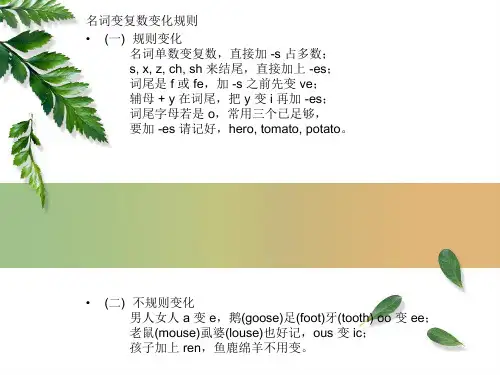
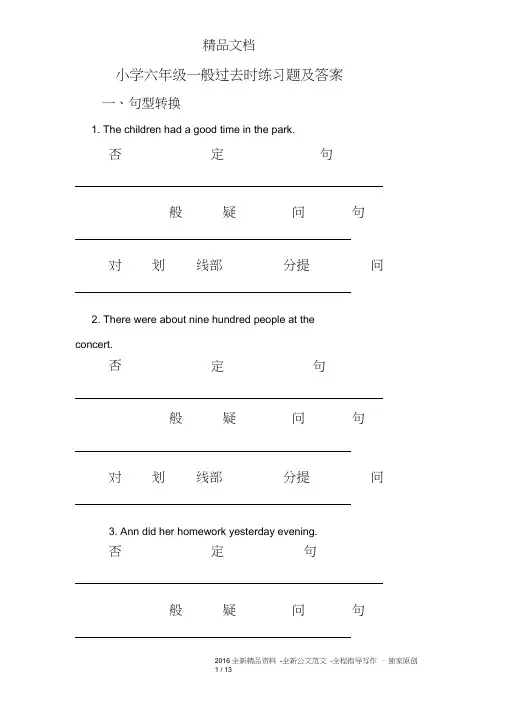
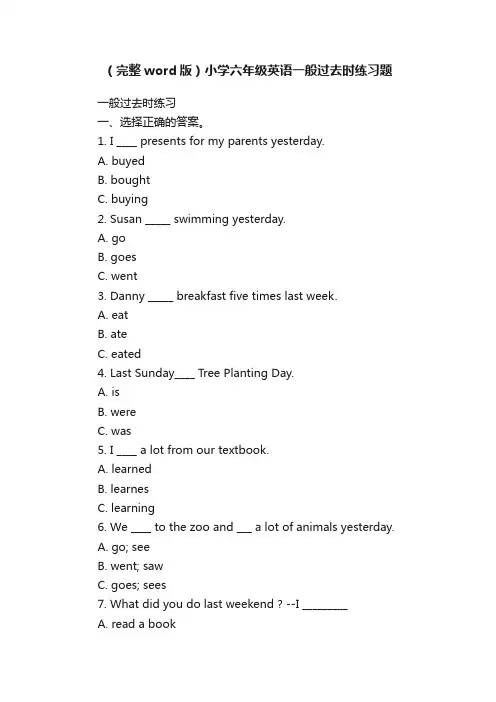
(完整word版)小学六年级英语一般过去时练习题一般过去时练习一、选择正确的答案。
1. I ____ presents for my parents yesterday.A. buyedB. boughtC. buying2. Susan _____ swimming yesterday.A. goB. goesC. went3. Danny _____ breakfast five times last week.A. eatB. ateC. eated4. Last Sunday____ Tree Planting Day.A. isB. wereC. was5. I ____ a lot from our textbook.A. learnedB. learnesC. learning6. We ____ to the zoo and ___ a lot of animals yesterday.A. go; seeB. went; sawC. goes; sees7. What did you do last weekend ? --I _________A. read a bookB. wash the clothesC. go fishing8. What did you do on your holiday? I ________A. bought a presentB. go skiingC. learn English9. What did he _____ yesterday? He ____ his homework.A. did; didB. do; didC. do; do10. Yesterday my presents and I ____ our house.A. were cleaningB. cleanedC. are going to clean11. What _____ to trees in the different season?A. happenB. happensC. happened12. Last summer. I ____ in the lake and played on the beach.A. swimB. swamC. will swim13. Did you eat good food in China? ______.A. Yes, I doB. No, I didn’tC. No, I did14. We played basketball _____.A. sometimesB. on SaturdaysC. last Saturday ( ) 1. She watered the flowers ________.A .tomorrowB .sometimesC .yesterday morning( ) 2.What ____ Mike do last weekend ?A doB doesC did( ) 3. I ___ my room last Sunday.A cleanedB cleanC am cleaning( ) 4. I often help my mother _____ housework.A doesB didC do( ) 5. _____ you _____ TV last night .A Do, watchB Did, watchC Did, watched( ) 6.---Did your father write an e-mail yesterday ?A Yes, he did.B Yes, he doesC No, he don’t( ) 7.They _____ on a trip in February ,2007.A are goingB goingC went( ) 8.We’re going to _____ mountains tomorrowA climbB climbedC climbing( ) 1. She watered the flowers ________.A tomorrowB sometimesC yesterday morning( ) 2.What ____ Mike do last weekend ? A do B does C did ( ) 3. I ___ my room last Sunday. A cleaned B clean C am cleaning ( )5. _____ you _____ TV last night .A Do, watchB Did, watchC Did, watched( ) 6.---Did your father write an e-mail yesterday ?A Yes, he did.B Yes, he doesC No, he don’t( ) 7.They _____ on a trip in February ,2007.A are goingB goingC went( ) 9. ____ he ____ football two days ago?A Does , playB Did , playedC Did , play二、改错题(请改正每个句子中的一个错误)1.How is Jane yesterday?_____________________________________2.He go to school by bus last week.________________________________3.He goes home at 6:00 last month.________________________________4.Did you saw him just now ?______________________________5.He wait for you three hours ago._________________________________6. I readed an English book last week_________________________________三.改写句子:1、Lucy did her homework at home.(改否定句)Lucy ________ _______ her homework at home.2、He found some meat in the fridge(冰箱).(变一般疑问句)___________ he __________ ___________ meat in the fridge?3、There was some orange in the cup.(变一般疑问句)_______ there _______ orange in the cup?4. Frank read an interesting book about history. (一般疑问句)_______ Frank _______ an interesting book about history?5. Why not go out for a walk? (同义句)_______ ________ ________ out for a walk?四.写出下列动词的过去式is\am_________ fly_______ plant________ are ________drink_________ play_______ go________ make ________does_________ dance________ worry________ ask _____taste_________ eat__________ draw________ put ______throw________ kick_________ pass_______ do ________visit ---- water---- live---- watch----play--- want---- need---- work----stay---- study---- listen---- stop---- shop---- like---- hate---- call ----第一类Amy is fat now.Amy is very thin two years ago.The dog is old nowThe dog was young three years ago.The water is dirty now.The water was clean last year.第二类They were students last yearThey were happy just nowWe were in the classroom five minutes agoThey were in America in 2013.第三类I go to school every dayI went to school yesterdayJohn visits the museums on FridaysJohn visited the museums last summerTim buys a book in the morningTim bought a book last Sunday一般现在时用法:描述过去某时刻发生的动作或所处的状态句型变换J将下列句子变为否定句、一般疑问句第一类:I was in the market yesterdayYou were a studentThe cat was illI was unhappy第二类We had 4 lessonsI slept just nowI had a dream yesterdayI went to school last weekI became an alien 20 years ago.小结:助动词did本领大,否定疑问都靠它Did还是照妖镜,动词见它现原形。
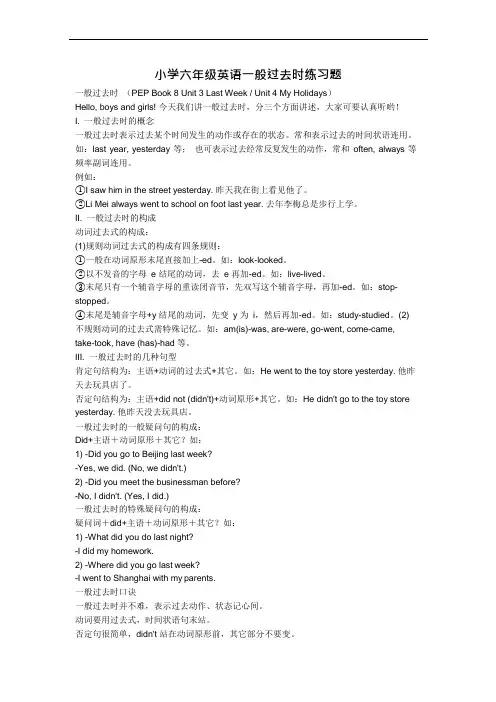
小学六年级英语一般过去时练习题一般过去时(PEP Book 8 Unit 3 Last Week / Unit 4 My Holidays)Hello, boys and girls! 今天我们讲一般过去时,分三个方面讲述,大家可要认真听哟!I. 一般过去时的概念一般过去时表示过去某个时间发生的动作或存在的状态。
常和表示过去的时间状语连用。
如:last year, yesterday 等;也可表示过去经常反复发生的动作,常和often, always 等频率副词连用。
例如:①I saw him in the street yesterday. 昨天我在街上看见他了。
②Li Mei always went to school on foot last year. 去年李梅总是步行上学。
II. 一般过去时的构成动词过去式的构成:(1)规则动词过去式的构成有四条规则:①一般在动词原形末尾直接加上-ed。
如:look-looked。
②以不发音的字母e 结尾的动词,去e 再加-ed。
如:live-lived。
③末尾只有一个辅音字母的重读闭音节,先双写这个辅音字母,再加-ed。
如:stop- stopped。
④末尾是辅音字母+y 结尾的动词,先变y 为i,然后再加-ed。
如:study-studied。
(2)不规则动词的过去式需特殊记忆。
如:am(is)-was, are-were, go-went, come-came, take-took, have (has)-had 等。
III. 一般过去时的几种句型肯定句结构为:主语+动词的过去式+其它。
如:He went to the toy store yesterday. 他昨天去玩具店了。
否定句结构为:主语+did not (didn't)+动词原形+其它。
如:He didn't go to the toy store yesterday. 他昨天没去玩具店。
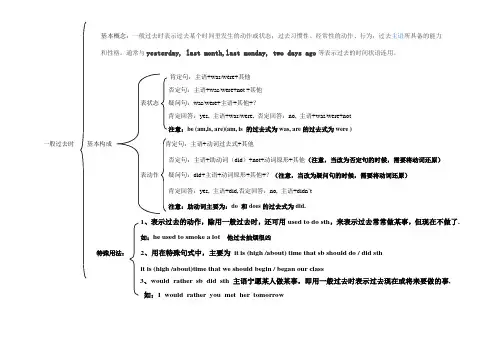
基本概念:一般过去时表示过去某个时间里发生的动作或状态;过去习惯性、经常性的动作、行为;过去主语所具备的能力和性格。
通常与yesterday, last month,last monday, two days ago等表示过去的时间状语连用。
肯定句:主语+was/were+其他否定句:主语+was/were+not +其他表状态疑问句:was/were+主语+其他+?肯定回答:yes, 主语+was/were, 否定回答:no, 主语+was/were+not注意:be (am,is, are)(am, is 的过去式为was, are的过去式为were )一般过去时基本构成肯定句:主语+动词过去式+其他否定句:主语+助动词(did)+not+动词原形+其他(注意,当改为否定句的时候,需要将动词还原)表动作疑问句:did+主语+动词原形+其他+?(注意,当改为疑问句的时候,需要将动词还原)肯定回答:yes, 主语+did,否定回答:no, 主语+didn’t注意:助动词主要为:do 和does的过去式为did.1、表示过去的动作,除用一般过去时,还可用used to do sth,来表示过去常常做某事,但现在不做了.如:he used to smoke a lot 他过去抽烟很凶特殊用法:2、用在特殊句式中,主要为it is (high /about) time that sb should do / did sthit is (high /about)time that we should begin / began our class3、would rather sb did sth 主语宁愿某人做某事,即用一般过去时表示过去现在或将来要做的事,如:I would rather you met her tomorrow过去式动词的变化规则eat-ate take-took run-ran sing-sang put-put make-made read-read write-wrote draw-drewdrink-drank fly-flew ride-rode speak-spoke sweep-swept swim-swam sit-sat。
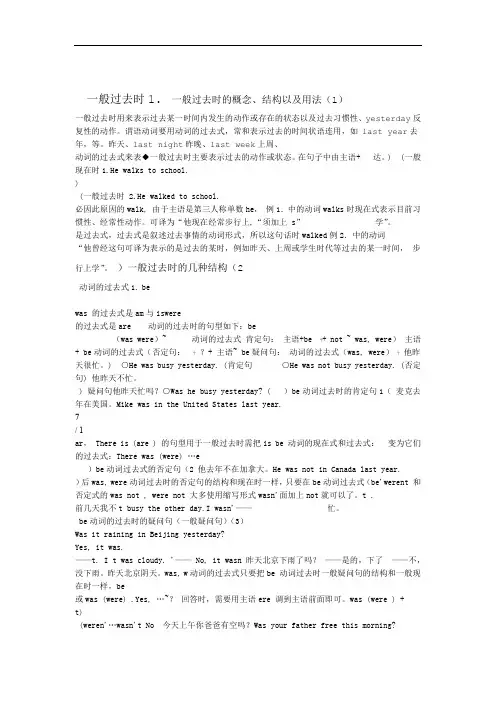
一般过去时1.一般过去时的概念、结构以及用法(1)一般过去时用来表示过去某一时间内发生的动作或存在的状态以及过去习惯性、yesterday反复性的动作。
谓语动词要用动词的过去式,常和表示过去的时间状语连用,如 last year去年,等。
昨天、last night昨晚、last week上周、动词的过去式来表◆一般过去时主要表示过去的动作或状态。
在句子中由主语+ 达。
) (一般现在时1.He walks to school.)(一般过去时 2.He walked to school.必因此原因的walk, 由于主语是第三人称单数he,例1.中的动词walks时现在式表示目前习惯性、经常性动作。
可译为“他现在经常步行上,“须加上 s”学”。
是过去式,过去式是叙述过去事情的动词形式,所以这句话时walked例2.中的动词“他曾经这句可译为表示的是过去的某时,例如昨天、上周或学生时代等过去的某一时间,步行上学”。
)一般过去时的几种结构(2动词的过去式1.bewas 的过去式是am与iswere的过去式是are 动词的过去时的句型如下:be(was were)~ 动词的过去式肯定句:主语+be ?+ not ~ was, were)主语+ be动词的过去式(否定句:??+ 主语~ be疑问句:动词的过去式(was, were)?他昨天很忙。
) ○He was busy yesterday. (肯定句○He was not busy yesterday. (否定句) 他昨天不忙。
) 疑问句他昨天忙吗?○Was he busy yesterday? ( )be动词过去时的肯定句1(麦克去年在美国。
Mike was in the United States last year.7/ 1ar, There is (are ) 的句型用于一般过去时需把is be 动词的现在式和过去式:变为它们的过去式:There was (were) …e)be动词过去式的否定句(2 他去年不在加拿大。
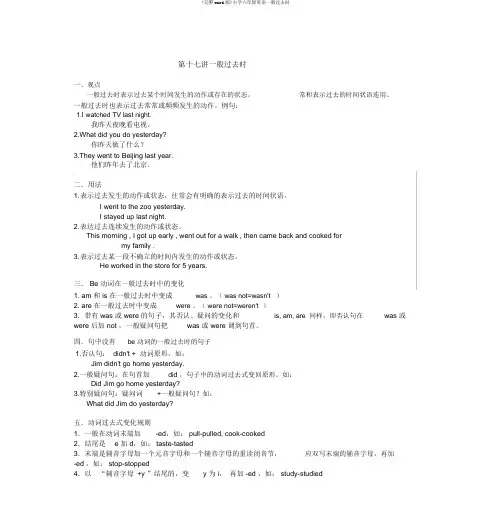
第十七讲一般过去时一.观点一般过去时表示过去某个时间发生的动作或存在的状态,常和表示过去的时间状语连用。
一般过去时也表示过去常常或频频发生的动作。
例句:1.I watched TV last night.我昨天夜晚看电视。
2.What did you do yesterday?你昨天做了什么?3.They went to Beijing last year.他们昨年去了北京。
二.用法1.表示过去发生的动作或状态,往常会有明确的表示过去的时间状语。
I went to the zoo yesterday.I stayed up last night.2.表达过去连续发生的动作或状态。
This morning , I got up early , went out for a walk , then came back and cooked formy family .3.表示过去某一段不确立的时间内发生的动作或状态。
He worked in the store for 5 years.三. Be 动词在一般过去时中的变化1. am 和 is 在一般过去时中变成was 。
( was not=wasn't)2. are 在一般过去时中变成were 。
( were not=weren't )was 或3.带有 was 或 were 的句子,其否认、疑问的变化和is, am, are 同样,即否认句在were 后加 not ,一般疑问句把was 或 were 调到句首。
四.句中没有be 动词的一般过去时的句子1.否认句: didn't + 动词原形,如:Jim didn't go home yesterday.2.一般疑问句:在句首加did ,句子中的动词过去式变回原形。
如:Did Jim go home yesterday?3.特别疑问句:疑问词+一般疑问句?如:What did Jim do yesterday?五.动词过去式变化规则1.一般在动词末端加-ed,如: pull-pulled, cook-cooked2.结尾是 e 加 d,如: taste-tasted3.末端是辅音字母加一个元音字母和一个辅音字母的重读闭音节,应双写末端的辅音字母,再加-ed ,如: stop-stopped4.以“辅音字母+y ”结尾的,变y 为 i,再加 -ed ,如: study-studied六.真题再现() 1. The boythe tree last week.A.is watering2.I _____(see) his name in the newspaper yesterday.由于句中出现了表示过去的时间状语last week 和 yesterday ,因此正确答案分别为: 1. C精点精练一、用动词的适合形式填空。
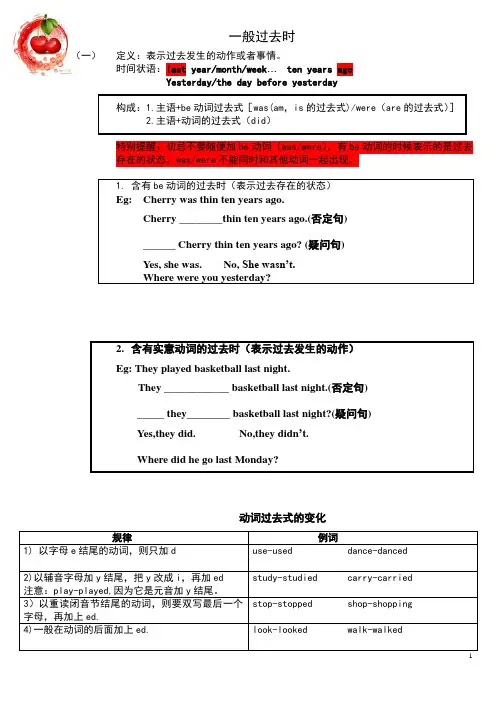
一般过去时(一)定义:表示过去发生的动作或者事情。
时间状语:last year/month/week… ten years agoYesterday/the day before yesterday构成:1.主语+be动词过去式[was(am,is的过去式)/were(are的过去式)]2.主语+动词的过去式(did)特别提醒:切忌不要随便加be动词(was/were),有be动词的时候表示的是过去存在的状态,was/were不能同时和其他动词一起出现。
1.含有be动词的过去时(表示过去存在的状态)Eg: Cherry was thin ten years ago.Cherry ________thin ten years ago.(否定句)______ Cherry thin ten years ago? (疑问句)Yes, she was. No, She wasn’t.Where were you yesterday?2.含有实意动词的过去时(表示过去发生的动作)Eg: They played basketball last night.They ____________ basketball last night.(否定句)_____ they________ basketball last night?(疑问句)Yes,they did. No,they didn’t.Where did he go last Monday?动词过去式的变化规律例词1)以字母e结尾的动词,则只加d use-used dance-danced2)以辅音字母加y结尾,把y改成i,再加edstudy-studied carry-carried注意:play-played,因为它是元音加y结尾。
stop-stopped shop-shopping3)以重读闭音节结尾的动词,则要双写最后一个字母,再加上ed.4)一般在动词的后面加上ed. look-looked walk-walked专项训练Ex.1用所给动词的适当形式填空。
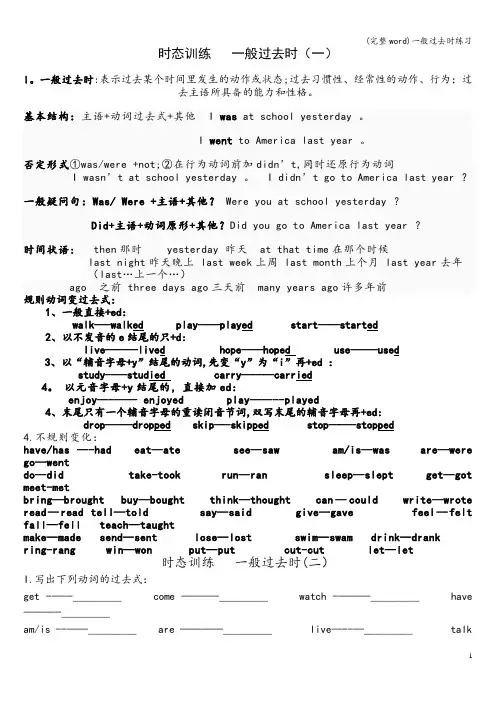
时态训练一般过去时(一)I。
一般过去时:表示过去某个时间里发生的动作或状态;过去习惯性、经常性的动作、行为;过去主语所具备的能力和性格。
基本结构:主语+动词过去式+其他 I was at school yesterday 。
I went to America last year 。
否定形式①was/were+not;②在行为动词前加didn’t,同时还原行为动词I wasn’t at school yesterday 。
I didn’t go to America last year ?一般疑问句:Was/ Were +主语+其他?Were you at school yesterday ?Did+主语+动词原形+其他?Did you go to America last year ?时间状语: then那时 yesterday 昨天 at that time在那个时候last night昨天晚上 last week上周 last month上个月 last year去年(last…上一个…)ago 之前 three days ago三天前 many years ago许多年前规则动词变过去式:1、一般直接+ed:walk---walked play--—played start—--started2、以不发音的e结尾的只+d:live———lived hope--—hoped use-——used3、以“辅音字母+y”结尾的动词,先变“y”为“i”再+ed:study--—studied carry———carried4。
以元音字母+y结尾的,直接加ed:enjoy—-—— enjoyed play——--played4、末尾只有一个辅音字母的重读闭音节词,双写末尾的辅音字母再+ed:drop—-—dropped skip---skipped stop——-stopped4.不规则变化:have/has —-had eat—ate see—saw am/is—was are—were go—wentdo—did take-took run—ran sleep—slept get—got meet-metbring—brought buy—bought think—thought can—could write—wrote read—read tell—told say—said give—gave feel—felt fall—fell teach—taughtmake—made send—sent lose—lost swim—swam drink—drankring-rang win—won put—put cut-cut let—let时态训练一般过去时(二)I.写出下列动词的过去式:get --—-_________ come ———-_________ watch -———_________ have ———-_________am/is --——_________ are ————_________ live—--—_________ talk-—-—_________cook -——-_________ work-——-_________ can -———_________ like—--—_________read-——-_________ write —-——_________ dance-—-—_________ give——--_________teach-—-—_________ study—-——_________ eat ———-_________ drink--——_________bring———-_________ help-——-_________ want —---_________ use—---_________stay ————_________ visit--—-_________ ride--—-_________ take -——-_________climb ----_________ wear---—_________ laugh ——--_________ go--—-_________sleep--—-_________ put--—-_________ borrow ———-_________ wait———-_________send-———_________ tell-——-_________ carry -—--_________ drop——-—_________make —--—_________ finish————_________ run —-——_________ meet--—-_________walk————_________ see-—-—_________ wash —-——_________ bump ——--_________play——--_________ skip-——-_________ ring ——--_________ carry —-—-_________win —--—_________ lose----_________ listen--—-_________ fall -—-—_________photo —--—_________ rain ——-—_________ jump—-——_________ happen----________hope ——-—_________ look ———-_________ stop ——-—_________ swim ——-—_________一般过去时(三)单项选择()1。
第十七讲一般过去时一. 概念一般过去时表示过去某个时间发生的动作或存在的状态,常和表示过去的时间状语连用。
一般过去时也表示过去经常或反复发生的动作。
例句:1.I watched TV last night.我昨天晚上看电视。
2.What did you do yesterday?你昨天做了什么?3.They went to Beijing last year. 他们去年去了北京。
二.用法1.表示过去发生的动作或状态,通常会有明确的表示过去的时间状语。
I went to the zoo yesterday.I stayed up last night.2.叙述过去连续发生的动作或状态。
This morning , I got upearly , went out fora walk , then cameback and cookedfor my family .3.表示过去某一段不确定的时间内发生的动作或状态。
He worked in the store for 5 years.三.Be动词在一般过去时中的变化1. am 和is在一般过去时中变为was。
(was not=wasn't)2. are在一般过去时中变为were。
(were not=weren't)3. 带有was或were的句子,其否定、疑问的变化和is, am, are一样,即否定句在was或were后加not,一般疑问句把was或were调到句首。
四.句中没有be动词的一般过去时的句子1.否定句:didn't +动词原形,如:Jim didn't go home yesterday.2.一般疑问句:在句首加did,句子中的动词过去式变回原形。
如:Did Jim go home yesterday?3.特殊疑问句:疑问词+一般疑问句?如:What did Jim do yesterday?五.动词过去式变化规则1.一般在动词末尾加-ed,如:pull-pulled, cook-cooked 2.结尾是e加d,如:taste-tasted3.末尾是辅音字母加一个元音字母和一个辅音字母的重读闭音节,应双写末尾的辅音字母,再加-ed,如:stop-stopped 4.以“辅音字母+y”结尾的,变y为i,再加-ed,如:study-studied六.真题再现( ) 1. The boythe tree last week.A. is wateringB. watersC. watered2. I _____(see) his name in the newspaper yesterday.因为句中出现了表示过去的时间状语last week和yesterday,所以正确答案分别为:1. C 2.saw精点精练一、用动词的适当形式填空。
六年级常用过去式规则变形1、动词原形后加-ed:laugh---laughed look---looked point---pointed shout---shoutedshow---showed walk---walked visit---visited pick---pickedplay---played happen---happened watch---watched call---calledwant---wanted invent---invented climb---climbed pass---passedwish---wished kick---kicked listen---listened2、以-e结尾的动词加-d:like---liked love---loved live---lived hope---hopedmove---moved dance---danced use---used save---saved3、以辅音字母加-y结尾的词,变y为i, 再加-ed:try---tried study---studied cry---cried worry---worriedhurry---hurried carry---carried copy---copied4、重读闭音节词,双写最后一个辅音字母,再加-ed:stop---stopped shop---shopped hop---hopped drop---droppedplan---planned chat---chatted jog---jogged slip---slipped注意:以元音字母加- y结尾的词,直接加-ed, 如:play---played, enjoy---enjoyed发音规律: -ed在清辅音后发音为/t/,在浊辅音和元音后发音为/d/,在/t/、/d/后发音为/id/不规则变形am---was is---was are---were make---madecan---could tell---told get---got say---saiddo---did have---had become---became come---camefly---flew go---went see---saw take---tookmeet---met lose---lost know---knew hold ---heldfind---found think---thought bring---brought buy---boughtcatch---caught teach---taught wear---wore fall---felleat---ate drink---drank read---read hurt---hurtcut---cut put---put write---wrote give---gavesing---sang sit---sat ring---rang begin---beganwin---won sleep---slept sweep---swept keep---keptgrow---grew draw---drew throw---threw wake---wokebreak---broke speak---spoke may---might hear---heardsend---sent lend---lent spend---spent understand---understood stand---stood drive---drove ride---rode feel---felt。
重点语法
一般过去时
1.定义:表示过去发生的事情。
2.一般过去式be动词用was,were。
3.一般过去时动词要用过去式,动词变过去式规则:
1)一般直接加ed.
2)以不发音的e结尾直接加d.
3)辅音+y结尾,把y改i+ed.
4)辅元辅,倒着数,双写最后的字母+ed.
4.一般过去时关键词:
yesterday(昨天),last year(去年),last month(上个月),last night(昨晚),last week(上周),three days ago(三天前),in+过去年份(如in 2001),this morning(今天早上)等等。
5. 不规则动词的过去式形式:
6.一般过去式一般疑问句:
be动词was,were时,把was,were放在句首。
Was there any +可数名词单数或不可数名词....? Yes, there was./No, there wasn’t.
Were there any+可数名词复数.....?
Yes, there were./No, there weren’t.
有动词时变一般疑问句,把Did放句首,动词恢复原形。
Did+主语+动词原形....?
Yes,...did./No,...didn’t.
7.一般过去时的特殊疑问句形式:
What did+主语+动词原形...?
回答:主语+动词过去式...。
第一讲过去式一概念表示在过去某个时间里所发生的动作或存在的状态。
通常在句子里找到表示过去时间的词或词组。
如:yesterday, yesterday morning, yesterdayafternoon, yesterday evening, the day before yesterday, last night,last week, last month, last year, a moment ago, just now, two days ago,a week ago, in 1990等。
如:I went to bed at eleven last night. 昨晚我11:00睡觉。
二动词过去式的构成规律(一)规则动词的过去式1,一般情况下,在动词原形后面加-ed;Look--- looked play----played start--- started visit—visited2, 以不发音e结尾的动词,在词尾直接加-d;Live—lived use---used3, 以“辅音字母+y”结尾的动词,先将y 改成i,再加–ed;Study---studied try—tried fly---flied4,以重读闭音节(即辅音+元音+辅音)或 r 音节结尾,末尾只有一个辅音字母的动词,要先双写这个辅音字母后,再加–ed。
Stop---stopped plan---planned preferred(二)不规则动词的过去式1 改变动词中的元音;Begin--- began drink---drank come---came eat---ateGrow---grew run---ran know---knew win---won speak---spokeTake ---took write ---wrote get---got2 变词尾的-d 为-tBuild---built lend---lent send---sent spend--spent bend--bent3 与动词原形一样;Cut---cut put---put cost----cost hurt---hurt shut---shut4 变-ay 为—aid(少数动词)Say---said pay---paid lay---laid5 采用不同词根;Sell--- sold teach----taught buy----bought6 其他Am/is ---was are---were have/has--- had do---did二加–ed 后的读音方法1 ed加在清辅音后面读/t/Finished/-t/ help /-t/ asked/-t/2 ed 加在浊辅音或元音结尾的,读/d/Played/-d/ lived/-d/ enjoyed/-d/3 ed 加在/t/或/d/后面,读/id/Wanted /-tid/ needed/-did/ visited /-tid/过去时练习:写出下列动词的过去式Is\am______ fly___ plant_____ are_____ drink_____Play ______ go____ make______ does_____ dance_____Worry______ ask____ taste_______ eat_____ draw_____Put_____ throw______ kick_______ pass_____ do______用所给动词的适当形式填空1 We_____ (live) in Japan last year.2 Susan_____(stop) the car on the street yesterday.3 My mother____(clean) my room and I _____( study) for the English testlast Sunday.4 What____ you_____(do) last night?5 On Saturday morning I ____(play) football二用括号内所给动词的适当形式填空(1)May_____(finish) her homework very late yesterday evening.(2)Han Mei_____(bring) her pet to the park that day.(3)His father______(buy) a new computer for him last week(4)Miss Du______ (walk) to work every day last term.(5)We____(move) to Shenyang 8 years ago.(6)_____ you _________(have) bread for breakfast this morning?(7)She_______(give) me a nice present last night.(8)The police______(stop) the car and_____(catch) the thief (小偷) just now.(9)Tom ____(carry)water for the old man last Saturday.(10)Uncle Wang______(come)into the room and______(find) something to eat.(11)Lily______(study)in the classroom for two hours and then____(leave).(12)Jimmy______(do) a lot today. He______(go) shopping and_____(cook)supper.(13)We_____(go) to the cinema last night. The film_____(be)very good.(14)What time ______you________(get) to school this morning?三句子变化(一)一般过去时的一般疑问句1.把 was, were放在句首,其余位置不变。